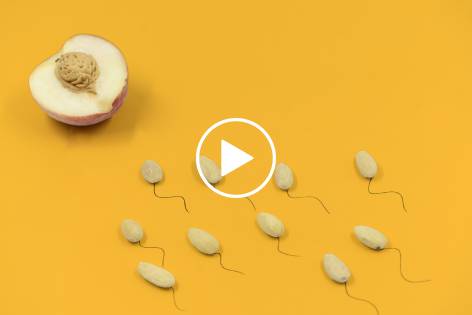
LMU 151 – The Sperm Diet: How Dietary Changes Can Supercharge Sperm Quality
Source: Journal Public Library of Science Biology (December 2019)
Lifestyle Medicine Update (Feb 7, 2020)
Introduction:
In a groundbreaking study conducted at Linköping University in Sweden, the power of simple dietary changes to revolutionize sperm quality was unveiled. The research offered a ray of hope for men seeking to enhance their fertility and the potential to conceive. This eye-opening study delved into the lives of 15 healthy young men who, over a span of two weeks, embarked on a dietary journey that held the key to improving their sperm’s motility and quality.
The Nordic Nutrition Recommendations: A Blueprint for Health
The dietary regimen prescribed to these men adhered closely to the Nordic Nutrition Recommendations—a set of dietary guidelines aimed at promoting health and well-being among the populations of Denmark, Finland, Iceland, Norway, and Sweden. These recommendations form a blueprint for optimal nutrition, encompassing the consumption of vegetables, fruits, berries, pulses (such as beans, peas, and lentils), regular intake of fish, vegetable oils, whole grains, and low-fat alternatives for dairy and meat. On the flip side, they advise restraint in the consumption of red and processed meats, sugar, salt, and alcohol.
A Dietary Experiment: Sugar’s Intriguing Role
The study took an intriguing twist during its second week. While the participants continued to follow the same dietary guidelines, a significant tweak was introduced—they were now required to add a dose of simple sugar equivalent to roughly 3.5 liters of soda pop or 450 grams (16 ounces) of confectionery candy per day. This addition was a pivotal element of the experiment, aiming to explore the immediate impact of sugar on sperm quality.
Sperm Quality Assessment: A Journey of Transformation
The study embarked on a journey of exploration into the world of sperm quality, delving into indicators of health and the state of sperm motility—an essential factor governing sperm quality. The journey involved assessments conducted at three critical junctures: at the study’s outset, after the first week of healthy eating, and finally, after the second week, when sugar entered the dietary equation.
A Startling Revelation: Transformation in Two Weeks
The results of this study sent shockwaves through the scientific community. At the study’s commencement, one-third of the participants exhibited low sperm motility—a factor that directly influences sperm quality. This statistic mirrored the prevalence of low sperm motility within the general population. However, what unfolded next left researchers astounded: during the study, the sperm motility of all participants normalized. This astonishing revelation illuminated the profound and immediate impact of dietary practices on sperm motility, an insight with far-reaching clinical implications.
The Sweet Surplus: Sugar’s Non-Impact
A noteworthy finding emerged during the experiment’s second week—the introduction of substantial sugar intake did not negatively affect sperm motility or quality. This revelation was particularly surprising, as sugar has often been viewed with suspicion in discussions related to health and nutrition. The study’s outcomes illuminated the nuanced relationship between dietary components and sperm quality, emphasizing the dominant role of overall dietary patterns.
From Obesity to Deficiencies: The Gamut of Sperm Health
The study highlighted a crucial reality: the quality and motility of sperm are not immune to the influences of lifestyle and dietary choices. Factors such as smoking, obesity, type 2 diabetes, pre-diabetes, and nutritional deficiencies loom as potential threats to sperm health. These risk factors, unfortunately, hold sway over a considerable portion of the population, contributing to the compromise of sperm motility and quality. The implications are profound, affecting the prospects of conception for many couples.
A Path to Redemption: The Nordic Nutrition Recommendations
In closing, this study provides yet another testament to the symbiotic relationship between dietary and lifestyle patterns and sperm health. While numerous factors can influence sperm quality, embracing a diet aligned with the Nordic Nutrition Recommendations offers a beacon of hope. These findings underscore the potential for swift and significant improvements in sperm motility and quality in as little as one to two weeks, should men choose to follow these healthier dietary practices.
In the realm of fertility and reproductive health, knowledge is indeed power. By implementing dietary changes in line with these recommendations, men can empower themselves to take charge of their reproductive futures.
References:
- Public Library of Science Biology, December 2019. [Read the full study here](https://journals.plos.org/plosbiology/article?id=10.1371/journal.pbio.3000559).
- Nordic Nutrition Recommendations. [Explore the guidelines here](https://www.livsmedelsverket.se/en/food-habits-health-and-environment/dietary%20guidelines/naringsrekommendationer/?AspxAutoDetectCookieSupport=1).
Dr. Meschino

Dr. James Meschino
ABOUT THE AUTHOR
Dr. James Meschino, DC, MS, ROHP, is an educator, author, and researcher having lectured to thousands of healthcare professionals across North America. He holds a Master’s Degree in Science with specialties in human nutrition and biology and is recognized as an expert in the field of nutrition, anti-aging, fitness, and wellness as well as the author of numerous books.


